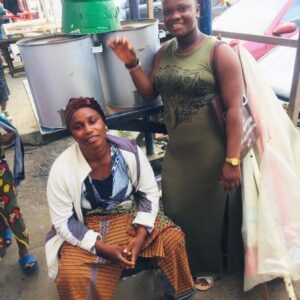A 20-year-old college student Famata K. Boakai has broken the Green Gold Liberia record as the highest distributor or sales agent of the locally produced energy-efficient cookstoves, following a two-month intensive training supported by the Environmental Protection Agency (EPA) with funding from UNDP.
Operating from her mother’s clothes business at the Waterside General Market in Monrovia, she has sold over 120 eco-cookstoves.
Famata, who is also the mother of a 3-yr old son, narrates that the training has changed her life. With the 10 percent she receives as commission on the sale of each cook stove, she has been able to enroll at the University of Liberia where she is reading accounting and management.
“The training was great, and I learned and have gained a lot from it. I was just staying at home doing nothing after graduating from high school last year. I believe that Green Gold found interest in me that was why I was called to be one of the sales agents. The training has changed my life in the sense that that I am no longer less busy. My little commission helped me pay for my entrance fees to enter the university, assists with transportation fares to and from school and the purchase of some school supplies and reading materials,” exclaimed Famatta.
She has developed a credit payment plan. Customers make requests for the quantity they need and agree to pay LRD 100 daily toward the credit. Famatta gets 4-6 of such requests daily.
She also attracts customers through a sensitization scheme on the benefits of the energy-efficient cookstoves that she conducts in the market, which Famatta noted is also used as feedback mechanism on the use of the stove by customers who buy and use them.

“This method has worked very well not only in attracting and encouraging more customers to buy and use the stoves but the positive feedback from customers that the use of the stove has reduced the high cost associated with the purchase of regular coal for cooking purposes is an added value”.
The General Manager for Green Gold Liberia Morris Dougba, applauded the support from UNDP and its Partners, pledging to remain committed to the full implementation of the programme.
“This young lady who recently enrolled at the University of Liberia has broken our record as the highest distributor or sales agent of our eco stoves. This is possible in my view due to the passion she brings to the job and her desire to be financially independent,” said Dougba.
UNDP, through its Energy and Environment (E&E) Programme is working with the EPA and other partners to support vulnerable coastal communities through training on the production of energy efficient cook stoves.
Famatta was part of the first batch of forty women ambassadors trained in the production of the first set of over 400 pieces of the energy-efficient cookstoves after being nudged to participate, and eventually became a sales agent.
The intervention is linked to improving livelihoods and promoting diversification and access to renewable energy by using innovative and sustainable methods to reduce deforestation and access clean energy.
It is also important for the successful implementation of Liberia’s Nationally Determined Contributions (NDCs) which has as one of its targets, the production of three hundred thousand (300,000) eco-stoves or energy efficient cook-stoves by 2030.
It is part of efforts to fight against an increase in Green House Gas (GHG) emissions. The use of traditional cookstoves impacts the health and well-being of poor families as well as the natural environment because the cutting down of trees to use as firewood and charcoal leads to deforestation and an increase in GHG emissions.
The use of energy efficient cookstoves reduces the quantity of wood and or charcoal used for cooking and heating and promotes a safe and healthy cooking environment with less smoke that affects the eyes and lungs.
Charcoal and firewood are the main sources of energy for cooking and heating for an estimated 95 percent of Liberia’s population. The unsustainable methods of production and usage are major drivers of deforestation in Liberia.
Only two percent of the population have access to clean fuels and technologies for cooking according to a World Bank report.

